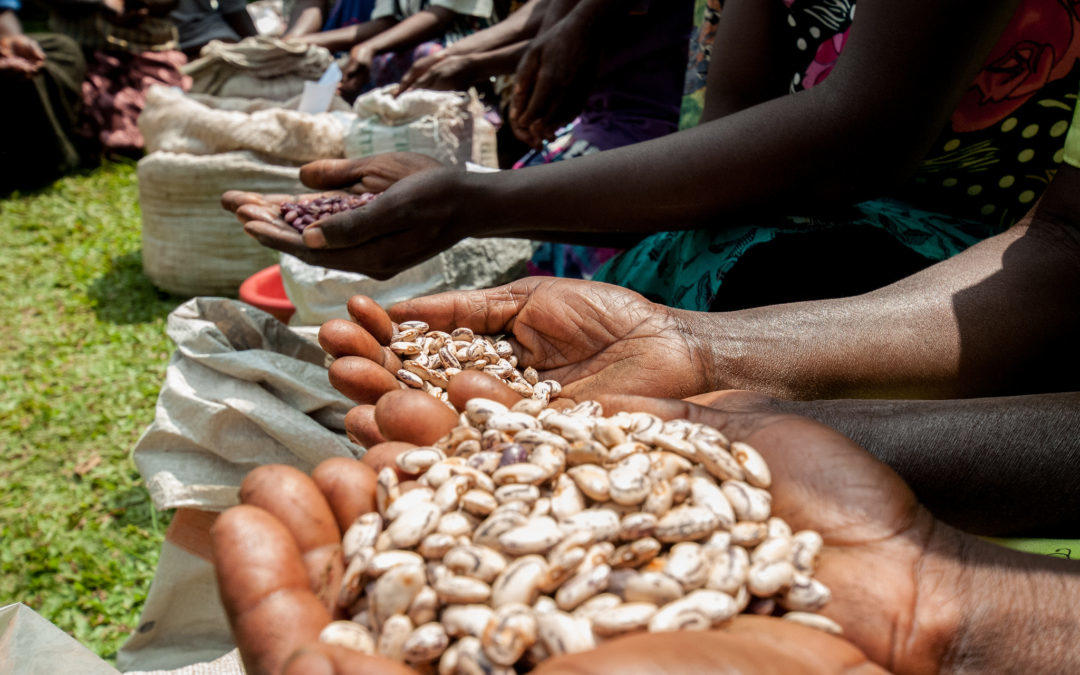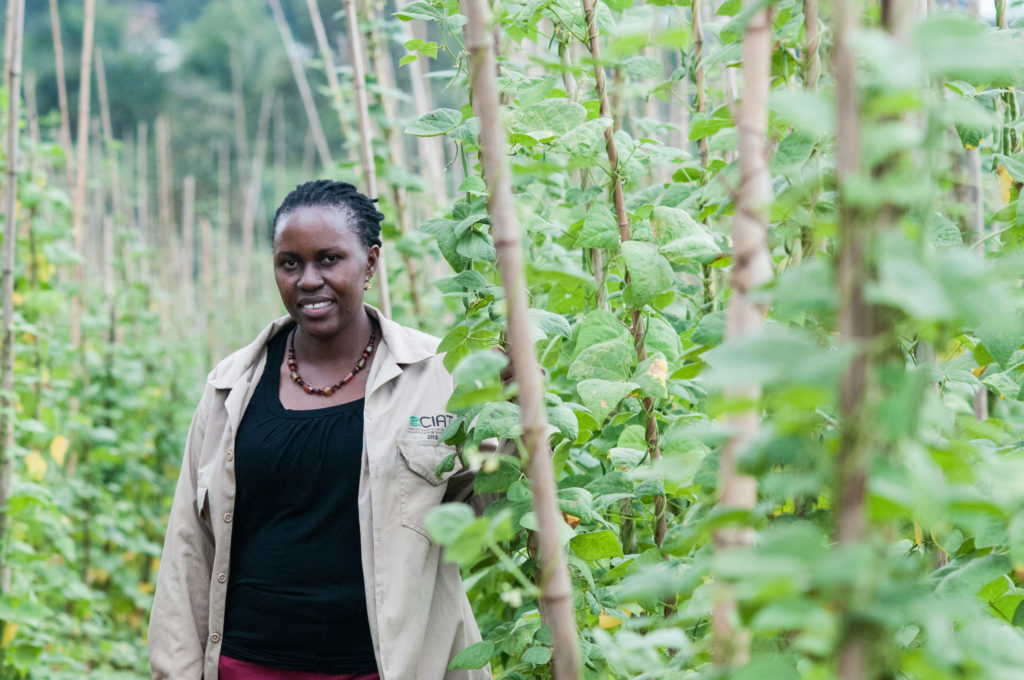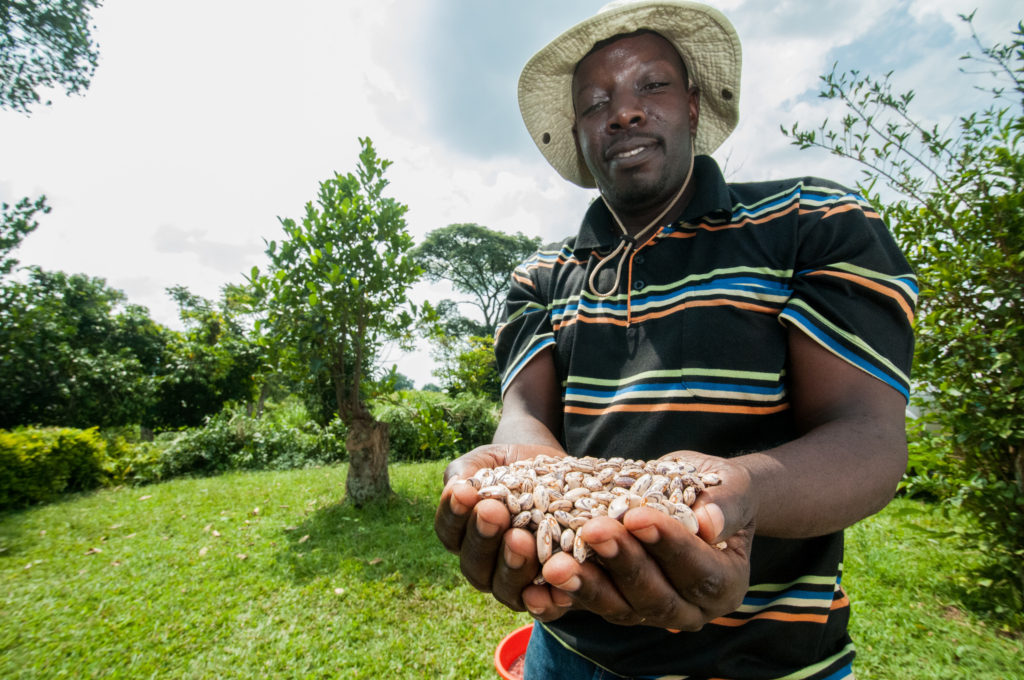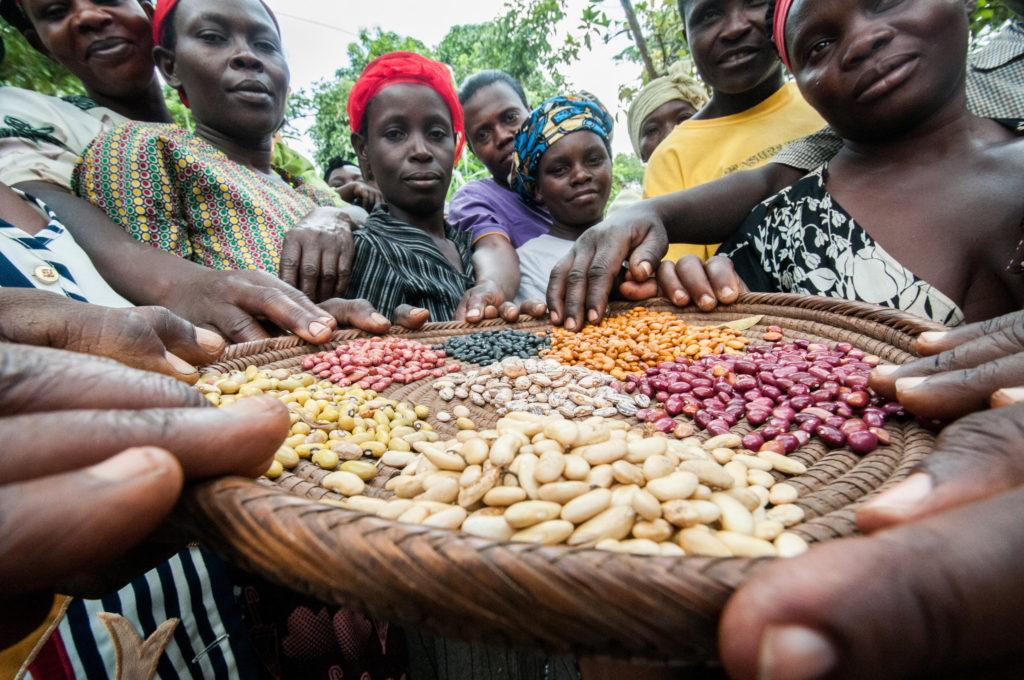First drought-resilient, high iron beans for Uganda released

Five new bean varieties bred with high iron and resilience to the impacts of drought have been released in Uganda for the first time.
The varieties – co-developed by the National Crops Resources Research Institute (NaCRRI), the Rwandan Agricultural Board (RAB) and CIAT through HarvestPlus – were released as part of the government’s strategy to tackle malnutrition and reduce anemia in the country, especially in children and expectant mothers.
Dr. Stanley Nkalubo, the breeder and leader of the Legumes Research Program at NaCRRI, which evaluated and released the varieties on Friday 22nd July 2016, said the biofortified beans will provide a cheap source of nutrition among poorer communities.
“The varieties, also known as NAROBEAN 1, 2, 3 4C and 5C, are an excellent source of iron. Instead of buying expensive supplements, communities can now buy and grow these beans as a way of boosting nutrition and reducing anemia – a major health concern in Uganda – also knowing they will get yield despite drought,” he said.
High iron to tackle anemia and iron deficiency
Dr. Wolfgang Pfeiffer, Global Director of Product Development and Commercialization at HarvestPlus, based at CIAT’s headquarters in Colombia, said: “We’re delighted these beans have been released to farmers and the wider community.
“It’s particularly good news for millions of women across Africa, because these beans can tackle iron deficiency and anemia, key health concerns in women, and also boost their incomes through improved yields,” he added.
Iron deficiency is the world’s leading nutritional ailment and can impair cognitive and physical development in children. Anemia, often caused by iron deficiency, increases risks to women during childbirth.
Sylvia Magezi, HarvestPlus Uganda Country Manager, said: “The HarvestPlus country program is happy that farmers can have more varieties to choose from.
HarvestPlus and CIAT have supported the NARO Bean breeding program for the last five years with the aim of making high iron beans available in all areas of the country. Both bush bean and climbing bean varieties will now be available for farmers, she said.
“In our work with farmers who have grown the high iron beans, mothers have observed that their children are more active and their performance in school has improved,” Magezi added.
Global breeding effort
Dr. Pfeiffer added that the release effort is a clear example of the commitment of bean breeders in Uganda and globally, who joined forces to ensure beans like these with qualities to tackle new challenges, are available to poorer communities for the first time in Uganda.
“These beans have been bred conventionally over many years, combining iron sources from our CIAT genebank in Colombia with locally adapted germplasm,” he said. “It is a long process to track down varieties with higher iron content, and then ensure that they can also tolerate harsh conditions in our environment, like drought,” he explained.
This year, unusually strong El Nino and record-high temperatures have devastated crops across southern and eastern Africa.

Dr. Clare Mukankusi, the Pan-Africa Bean Research Alliance’s (PABRA) breeder based at Uganda’s National Agricultural Research Organization.
Dr. Clare Mukankusi, the Pan-Africa Bean Research Alliance’s (PABRA) breeder based at Uganda’s National Agricultural Research Organization, said that the new release paves the way for future releases of high iron, drought resilient beans across Africa.
“These beans have to go decades of breeding hurdles to get to the stage of being released into the community. The varieties will not only give farmers better yields, but they are vital for smallholder farmers and communities who rely on rain-fed agriculture,” she added.
Despite efforts to curb iron deficiency through supplements and fortified foods, the condition affects an estimated 2 billion people worldwide.
Just two weeks ago, a study published in The Journal of Nutrition, provided new evidence that iron fortified beans can reverse anemia in women. The 18-week study involving iron-deficient women in Rwanda was the first of its kind to show that eating “biofortified” beans bred to contain more iron has a significant impact on iron levels in the blood.
HarvestPlus is a program convened by CIAT and the International Food Policy Research Institute. This breeding effort and bean release was made possible with support from the International Food Policy Research Institute (IFPRI), CIAT, HarvestPlus, with principal donors including the UK Government; the Bill & Melinda Gates Foundation; the U.S. Government’s Feed the Future initiative; the European Commission; and donors to the CGIAR Research Program on Agriculture for Nutrition and Health, of which HarvestPlus is a part.
We would like to thank all donors who supported this research through their contributions to the CGIAR Fund.
For more photographs see the album: Bean diversity buffers farmers against impacts of climate change
Photograph credits: G.Smith / CIAT
CALL TO ACTION
- Efforts are required tofurther improve biofortified bean yields beyond those of standard beans. Biofortified beans and the farmers that grown them would benefit from additional characteristics such as resistance to disease, and adaptation to poor soils.
- Biofortified beansneed to reach those farmers in the form of seed for planting, and creative mechanisms are needed achieve this on a broad scale across Africa.
- Biofortified beans must be part of public health policies to address malnutrition. To support this, nutritional education is needed to show the importance of biofortified beans and other nutritious crops that can constitute a healthy, balanced ‘food basket’.


